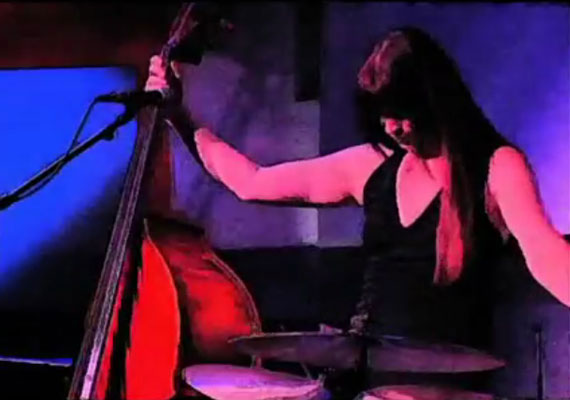
For some documentaries to work, all the director needs to do is turn on the camera and let her subjects chat away. In I Stand Corrected, there's chatting plus the bonus of some real fine jazz, the interplay of which combines to create a simple, compelling look at a very brave, extremely talented woman, Jennifer Leitham.
The thrust of the tale, though, is that, after a highly successful career as a southpaw player of the double bass, appearing with the likes of Mel Torme and George Shearing, at age 48, Ms. Leitham underwent sex reassignment surgery. Yes, she started out life as a John.
Growing up in Redding, Pennsylvania, in the '50s, was no picnic for a lad who used to sneak into the closets of his mom and his best friends' sisters to try on their dresses. John knew then that was what made him happy. "My body was not the right projection of what I felt like in my brain." Try telling that to "her" dad who insisted his son have crew cuts and don cowboy suits.
But John, as opposed to what you might conclude, was not gay. "I grew up attracted to women," yet also wanting to be one. And at his prom, his greatest wish was to be wearing his date's prom gown.
By good fortune, while struggling with sexual identity, John discovered he was a musician. "Music is the thing that saved me when I was going through the worst crisis of my life." First there were rock bands for which John sang, but when he discovered his singing voice was that of a female, possibly a true reflection of inner self, he gave up belting out for thirty years rather than divulge the truth he could hardly yet reveal to himself. "My voice was coming from my heart. I was female."
Then came the bass and Doc Severinsen, being a regular on The Tonight Show, plus gigs with Woody Herman, Benny Carter, and Peggy Lee. There was also a relationship with a woman that lasted over two decades in which John could become Jennifer once he entered the apartment. Then "she" would become "he" again back on stage.
Finally, Jennifer said no more. She was going to have the operation, but there was no easy sailing towards femalehood. Complications arose. A rare rectal-vaginal fistula and a resulting colostomy. Then there was the rejection by her parents and her long-time love, who was "homophobic" and didn't want to consider herself a lesbian. How could she be otherwise. Jennifer was now a woman both physically and in attire . . . so lesbian it would be if it would be at all.
But with time, Jennifer healed, and Doc Severinsen supported her decision, continuing to allow her to play in his band, but the rest of the jazz world was not as enthusiastic. As pianist Eric Doney, one of Jennifer's pals, notes, "Being gay is kind of a walk in the park compared to a gender displacement.... The jazz community is rather homophobic. Rock 'n' roll is not."
Yet currently Ms. Leitham has her own band plus several acclaimed recordings under her belt. And although she is still fighting the cold-shouldering of her career by some of those who used to employ her, she has never been more untroubled.
This path to contentment has been captured with empathy and dexterity by director Andrea Meyerson, who's fashioned all of her footage into an inspiring, timely, musical treat.
